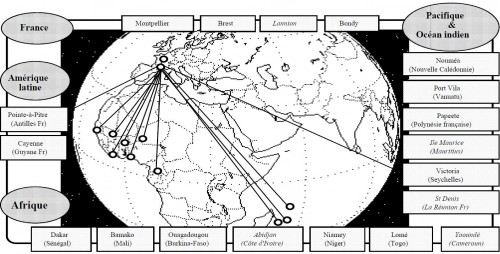A look back at West Africa’s RIOnet
Despite its shortcomings, we can’t forget how far current African infrastructure and ICT development has come since the early 1990’s. The following example highlights how foreign interests can aid developing nations by providing both physical and human resources for development.
RIO (meaning “Reseau Intertropical d’Ordinateurs”) was a network of electronic communication developed by ORSTOM, a French scientific research agency working in West Africa. Interestingly, this early network emerged from France’s imperialistic ties to Africa. The ORSTOM agency was founded after World War II and only existed in former French West African nations. The agency’s initial goals were to explore how to stop the spread of disease in French colonies. Eventually, the organization formed a telecommunications network connecting the regions with France. RIOnet linked 25 UNIX hosts in 10 countries giving about 80 access points. Burkina Faso, Cameroon, Congo, Ivory Coast, Mali, Niger, Senegal, Togo, Seychelles, and Madagascar were all connected to Montpellier, France via dial-up. NSRC’s database has a status update from November 1993:
Services: Email, Forums, Listserv, Electronic bulletins, User directory.
Users: About 1000. They are working for scientific research establishments, Universities, NGO’s, library. 13 000 Emails making about 50 MO are sent every month between North (Europe, America) and South Africa, Caribbean and Pacific) part of network.
Keeping links up 24 hours a day to Africa was not practical, however. Some countries turned off electricity at night. In addition, tariffs were high enough that a call to Paris 24 hours per day would be prohibitive. TCP/IP also had some problems in such an environment so the solution was UUCP. The UUCP F protocol ran on top of X.25 and calls were placed once or twice a day to transfer mail.
An archive site, museum.media.org explains even more about RIOnet. When a new site was added to the network, Pascal Renaud and local researchers would host a conference attended by government officials, PTT staff, any local non-governmental organizations (e.g., the UN), and university researchers. ORSTOM had a policy of allowing any of these people to use RIO. This open policy helped make ORSTOM part of the local community and helped spread mail access to many new parts of the world.
Supporting scientific computing in such a far-flung network is quite a challenge. Only a few sites had real computer support people. Dakar, for example, had one staffer to support the 15 Suns at that site. For other facilities, ORSTOM had an interesting support structure.
In France, military service is compulsory. An alternative, however is a system somewhat like the U.S. Peace Corps. ORSTOM, as a national laboratory, receives an annual quota of young engineers and puts them to work maintaining computers in far-away places.
For a detailed look at how many messages were sent, how much data was exchanged, and how many individuals used the network, a French-language paper from 1990-1992 is available here.













 Twitter
Twitter Facebook
Facebook Pinterest
Pinterest